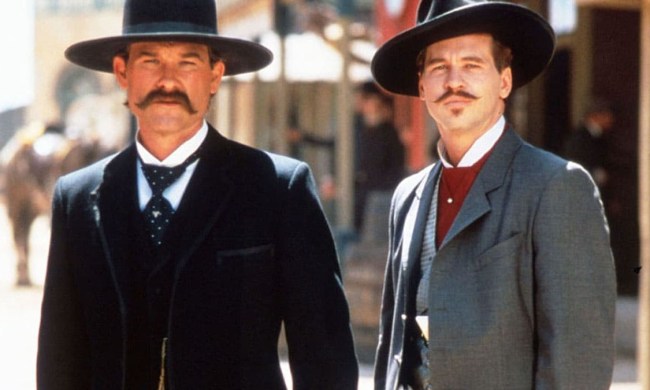When Paramount+ announced a series adaptation of Nicolas Roeg’s timeless cult classic The Man Who Fell to Earth from 1976, it seemed like another beloved cult classic unnecessarily adapted into a streaming series. (Picnic at Hanging Rock is the most egregious example of this popular trend.) We live in the age of nostalgia, and studios are looking for any movie that might work as a rebooted miniseries or television show to support the plethora of streaming services. However, the original The Man Who Fell to Earth isn’t exactly “viewer-friendly,” so what’s the need for a remake? If it’s faithful to the movie, will mainstream audiences find it a rewarding viewing experience? On the contrary, would the remake do the revered movie a disservice by changing too many things?
The Man Who Fell to Earth is intentionally challenging, blending bizarre imagery with complex and, at times, convoluted storytelling, resulting in a collection of scenes and events passing for a proper narrative. The Man Who Fell to Earth lacks cohesiveness and has glaring plot holes — surprising, considering the relatively straightforward plot — yet they seem intentional, in keeping with the project’s nature. The film is more interested in asking questions than answering them, leaving fans feeling overwhelmed, not only by the intense and powerful visuals but by the thought-provoking themes that are there to beguile and, perhaps, deliberately confuse.
The role he was born to play

The Man Who Fell to Earth is a combination of factors that came together to craft a one-of-a-kind film, chief among them the casting of David Bowie as the titular alien, Thomas Jerome Newton. With his androgynous looks and inherent out-of-place-ness, Bowie was the perfect choice to bring Thomas to life. He was not an actor, something that becomes glaring in several of the film’s most heightened moments. Still, this inexperience works in his favor; Thomas is detached, aloof, a man very much out of place on a planet he finds both repellant and fascinating.
Bowie — then at the height of his perpetually experimental career — is enigmatic as Thomas. He embodies Newton’s bewilderment without crossing into cartoonish territory. When Thomas is still innocent at the beginning of the film, Bowie is restrained, stoic, almost robotic. As the plot advances and Thomas falls into the trap of sex and alcohol, Bowie lets loose, and the rock star persona comes out without ever sacrificing the alien’s trademark awkwardness. A classically trained actor might have gone big during Thomas’s crucial scenes, but Bowie remains staunchly down to earth, even during the film’s most urgent moments.
The Man Who Fell to Earth lives and dies with Bowie, but the glam rocker glides carelessly through his scenes, never carrying the weight of the movie’s potential success or failure. He fits seamlessly with Roeg’s surreal world, looking like he came out of it. Bowie also plays with audiences’ perceptions in the way Roeg intended, hinting that Thomas might be delusional about his supposed alien nature on more than one occasion. It was a brilliant piece of inspired casting that we don’t see much of in modern cinema, further elevating The Man Who Fell to Earth into classic territory.
Love, damnation, or salvation?

In many ways, The Man Who Fell to Earth is a love story, but love has its limits. Academy Award nominee Candy Clark (American Graffiti) plays Thomas’ human lover, Mary-Lou. Bowie remains unaffected, marching to the beat of his own drum, much like Thomas himself, but Clark plays Mary-Lou with an enthusiasm that borders on camp. The dichotomy of their performances is often disorienting, at times frustrating, but always enthralling. The relationship itself is flawed and complicated, a conflict of interests and ideologies disguised as a love story. Mary-Lou and Thomas are both appetites asking too much of each other, ultimately discovering they’ve sucked each other dry.
The relationship perfectly captures one of the film’s central themes: The pursuit of personal satisfaction versus the fulfillment of duty. Thomas goes forward with his plan to build the spaceship that’ll take him back to his home world, but he still indulges in the earthly pleasures that Mary-Lou provides. He mentions he’s married, but neither seems to care as they enter a highly experimental relationship that awakens Thomas’ curiosity about the world.
Mary-Lou and Thomas challenge and tease each other, pushing their boundaries without expanding their worldview. Thomas doesn’t know or care about what Mary-Lou wants, while she can’t understand what he thinks. Roeg asks his audience the timeless question: an love survive with partners that might never fully understand one another? Is it even love, then?
For Roeg, life’s true punishment is loving what we cannot understand. The Man Who Fell to Earth presents love as the ultimate distraction and torture, a blessing and a curse in disguise. The film does not attempt to capture traditional romance because it is too cynical to believe in it. In its mind, love isn’t balance or peace, but chaos and disruption that can leave as easily as it once came.
Life is a wasteland

Ultimately, The Man Who Fell to Earth is a tale of bankruptcy: The ruin of the Earth, the body, and the mind. Thomas escapes his dry and barren planet looking for water to bring back, only to find himself in an entirely new and far more painful wasteland. His journey on Earth is marked by misery and emptiness of the spirit, interrupted only by a few moments of joy that seem futile in hindsight. His body never ages, his physicality doesn’t wither, but his spirit breaks beyond repair the more time he spends on Earth.
Eventually, Thomas becomes a prisoner of himself. Left alone with his own devices, he becomes despondent, seeking refuge in the distractions that earthly life offers him. Alcohol addiction is a major part of the film, eventually becoming Thomas’ true trap. He spends years locked in an ivory tower, but his mind is the prison he can’t escape. His youthful curiosity becomes weary experience, and his once impressive intellect becomes willful ignorance. After experiencing the heights of human life, Thomas ends his days at the very lowest. Yet, Roeg and Bowie refuse to take a stance on Thomas, against or in favor. The duo sticks to portraying Thomas’s journey as honestly as possible, painting a unique portrayal of addiction and misery heightened by the film’s deliberate ambiguity.
The Man Who Fell to Earth is the rare piece of cinema that stands out because of its very existence. It’s a science-fiction epic without any science, a love story without any romance, and one of the best space movies without ever showing space itself. The remake, out now on Paramount+, offers a new and modernized take on this timeless story, but it remains to be seen if the same honest despair that Roeg’s seminal film had is in this remake. The Man Who Fell to Earth is a unicorn of a film, the rare exploration of humanity that finds our flaws as intriguing as our strengths. It might be messy by today’s standards, but it’s still a worthy watch for film lovers. And if the remake approaches its subject with the same refreshing willingness as the original did, then Paramount+ might have a classic in the making.



